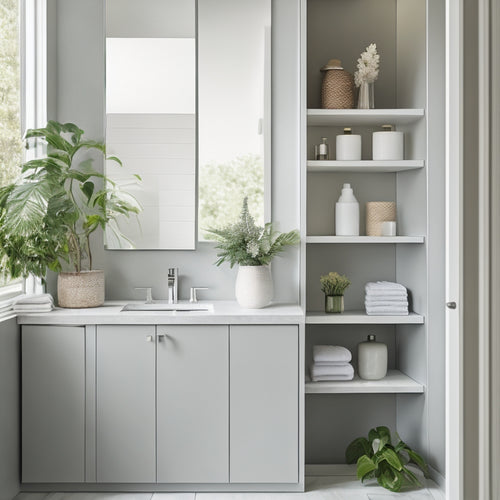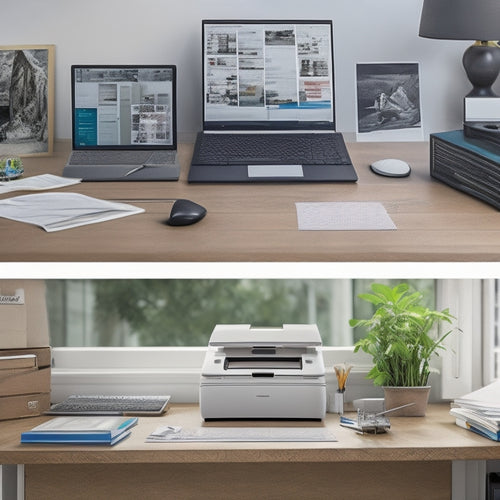
Experts Pick Top Basement Dehumidifiers for 2024
Share
We've scoured the market to bring you the top basement dehumidifiers for 2024, considering key factors like moisture removal capabilities, energy efficiency, and noise levels. Our experts assessed unique basement conditions, humidity levels, and temperature to recommend the right dehumidifier for your space. We've reviewed top models, weighing features like energy efficiency, noise levels, and humidity control settings. With regular maintenance, the right dehumidifier can create a healthy environment for your family. Now, let's get into the specifics of what makes these models stand out – and what you need to know to make an informed decision.
Key Takeaways
• Assess unique basement conditions, considering humidity level, temperature, and square footage to choose the right dehumidifier size and features.
• Energy Star certified models with impressive moisture removal capabilities and low noise levels are ideal for a dry and comfortable basement.
• Regular maintenance, including filter cleaning and water tank emptying, is crucial for peak performance and prolonging the dehumidifier's lifespan.
• Select a dehumidifier with humidity control settings to maintain ideal humidity levels between 30-50% for a healthy environment.
• Experts recommend energy-efficient models for utility bill savings and consider features like auto-restart and built-in pump for added convenience.
Basement Dehumidifier Essentials
When selecting a basement dehumidifier, we must consider several key factors, including the benefits of dehumidifiers, ideal humidity levels, and maintenance and usage requirements.
We need to choose the right dehumidifier size for our space, considering the square footage and humidity level. Proper placement is also important, as it affects the device's efficiency. We should position it in a well-ventilated area, away from walls and obstacles.
Additionally, we must monitor humidity levels regularly to make sure the dehumidifier is working effectively. This can be done using a built-in humidistat or a separate hygrometer.
Choosing the Right Dehumidifier
We need to assess our basement's unique conditions, including its size, humidity level, and temperature, to choose the right dehumidifier that meets our specific needs.
A dehumidifier that's too small won't effectively reduce humidity levels, while one that's too large will waste energy.
We should consider the recommended humidity range of 40-60% and select a dehumidifier that can cover our basement's square footage.
For instance, if our basement is around 4,000 sq ft, we'd need a dehumidifier like the Whynter that can handle that size space.
Top Dehumidifier Models Reviewed
After researching and testing various models, our team has narrowed down the top dehumidifier models that excel when it comes to performance, features, and value for different basement types and sizes.
We've considered factors like energy efficiency, noise levels, and user-friendly features. Our top picks include the Frigidaire 35 Pint Dehumidifier and the Whynter 50 Pint Dehumidifier, both of which are Energy Star certified and boast impressive moisture removal capabilities.
We've also looked at maintenance tips, such as regularly cleaning the air filter and emptying the water tank, to guarantee peak performance and prolong the lifespan of the dehumidifier.
With these models, you can trust that you're getting a reliable and effective solution for your basement's humidity issues.
Expert Recommendations and Tips
Our expert panel, comprising seasoned professionals like Jeremy Laukkonen and Deane Biermeier, shares their valuable insights and tips on selecting the right dehumidifier for your basement, based on their extensive experience and rigorous testing.
When it comes to maintenance, we emphasize the importance of regularly cleaning the air filter and emptying the water tank to guarantee efficient operation and prolong the lifespan of the dehumidifier.
Additionally, look for energy-efficient models, such as those with the Energy Star certification, to save on your utility bills.
By following these maintenance tips and considering energy efficiency, you'll be able to find the perfect dehumidifier for your basement.
Our expert recommendations will assist you in making an informed decision, ensuring your basement remains dry, comfortable, and healthy.
Dehumidifier Buying Guide
When selecting the perfect dehumidifier for your basement, take into account factors such as room size, humidity levels, and features like energy efficiency and noise levels to guarantee you find the ideal unit for your specific needs.
We consider dehumidifier size vital, as it directly affects humidity control. A unit that's too small won't effectively reduce humidity, while an oversized one will waste energy. We recommend choosing a dehumidifier that matches your basement's square footage and humidity levels.
Additionally, look for features like energy efficiency, noise levels, and humidity control settings to make sure you find a unit that fits your lifestyle. By considering these factors, you'll be able to find a dehumidifier that effectively controls humidity and provides a comfortable, healthy environment for your family.
Frequently Asked Questions
Can Dehumidifiers Be Used in Crawl Spaces With Limited Access?
We consider crawl spaces with limited access when choosing dehumidifiers, opting for compact, lightweight designs with easy-to-remove water tanks and filters, ensuring accessibility and efficient operation in tight spaces.
How Often Should I Replace the Air Filter in My Dehumidifier?
'We inspect our dehumidifier's filter every 1-2 months, depending on usage, to guarantee excellent air quality and filter maintenance. We clean or replace it as needed, following the manufacturer's instructions, to breathe easy and keep our space healthy.'
Are Dehumidifiers Effective in Removing Musty Odors From Basements?
We find that dehumidifiers are effective in removing musty odors from basements by controlling humidity, which prevents mold growth, and subsequently, eliminates odor sources, leaving our basement spaces feeling fresher and healthier.
Can I Use a Dehumidifier in an Unheated Garage or Storage Area?
We've seen it happen: our friend's unheated garage, once a treasure trove of stored items, was ruined by moisture damage due to high garage humidity. Yes, we can use a dehumidifier there to prevent this.
Do Dehumidifiers Consume a Lot of Electricity and Increase My Bills?
We're concerned about our electricity bills, so we choose energy-efficient dehumidifiers that won't break the bank. Look for the Energy Star certification, as it guarantees cost savings and reduces our environmental footprint.
Related Posts
-

Modern Bathroom Cabinetry for Small Bathrooms
When designing modern bathroom cabinetry for small spaces, your focus should be on maximizing storage while embracing...
-

Innovative Tool Empowers Writing With Digital Mapping
Digital mind mapping tools have revolutionized the writing process by providing a powerful platform for conceptual or...
-

Easy Tips to Resize Printables for Any Paper Size
To resize printables for any paper size, it's crucial to understand the importance of maintaining aspect ratio and pr...


